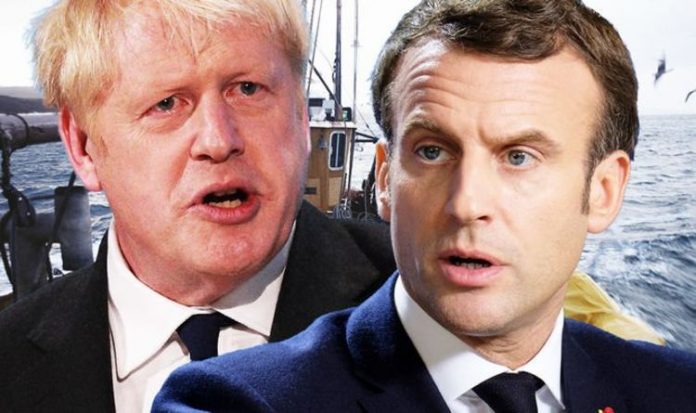Brexit trade talks are yet to reach a formal agreement as disagreements over fishing and regulation remain a sticking point between the UK and the EU. European Commission President Ursula von der Leyen said today that there is a “path to an agreement”, but this has not come without tension between the UK and France. Last week there were threats of military intervention coming from Britain, as the Government readied gunboats to protect British waters from European fishermen come January 1 – when the transition period ends.
Tobias Ellwood, Tory chairman of the Commons Defence Committee, branded this move “irresponsible”, while former European Commissioner Lord Chris Patten accused Prime Minister Boris Johnson of behaving like an “English nationalist”.
Manfred Weber, a German MEP and leader of the European People’s Party in the European Parliament, called for a more tranquil approach to negotiations over fisheries.
He said: “The world is full of enemies of the European way of life, our freedoms and our values. We should fight these enemies together instead of each other.”
Meanwhile, the French government responded with “keep calm and carry on” – alluding to the British war time slogan.
The gunboat fears surrounding Brexit talks evoke the heightened tensions seen between the UK and Iceland during the Cod Wars.
The row came in 1952 when Iceland imposed a four-mile boundary in its fishing waters, excluding foreign vessels from entering.
This angered Britain – leading to the Government banning fish caught in Icelandic waters.
Iceland’s Foreign Minister Benediktsson made a surprising statement that fanned the flames of already tense relations between British and Icelandic figures.
He said of the ban: “Short of a declaration of war by Great Britain he could conceive no more unfriendly act than that Her Majesty’s Government should stand by while such a ban was imposed.”
READ MORE: Brexit fisheries chaos as Dutch warn ‘many will go bankrupt’
In 1958, after Iceland had fumed at a ban in Britain, Reykjavik expanded the zone to 12 miles and banned any foreign fleets from fishing in these waters, in defiance of international law.
The UK challenged the move and sent Royal Navy frigates to accompany fishing boats into the exclusion zone to continue fishing.
The move was compared to a “declaration of war” by Iceland, as the country fumed at the UK’s actions in a row similar to the current tensions between the UK and France.
Icelandic boats and British fishing vessels clashed in the waters, and were rammed by UK boats sparking a threat from Iceland’s coastguard to open fire.
In 1961, the two countries came to an agreement that allowed Iceland to keep its 12-mile zone in return for conditional access for UK boats.
Tensions once again reignited in 1973 when Iceland extended its exclusive fishing zone to 50 miles.
DON’T MISS
Brexit fishing: French refuse to back down: ‘UK will lose more’ [INSIGHT]
Brexit fishing chaos as ‘conflict on horizon’ amid gunboat threats [ANALYSIS]
Brexit fishing panic: Dutch admit ‘we are afraid’ in plea for deal [INSIGHT]
The UK repeated its method from the 1950s – sending Royal Navy frigates.
The British embassy in Reykjavik was stoned and a Grimsby trawler was shot at.
UK and French fishermen have endured tensions more recently after ‘scallop wars’ in 2012 and 2018.
The latter clashes were especially hostile, as it quickly descended into violence when three British trawlers were chased by French boats, hit by stones and rammed by their counterparts.
Petrol bombs and flares were thrown as the British boats in the attacks from French fishermen came despite UK vessels being permitted to fish in the Bay of Seine area.







